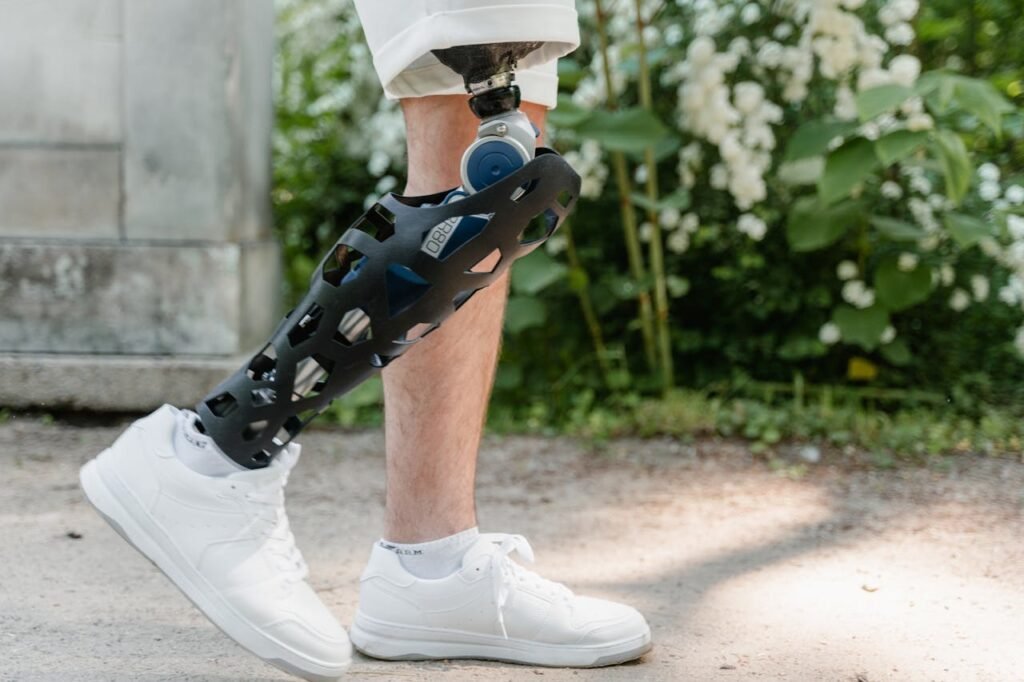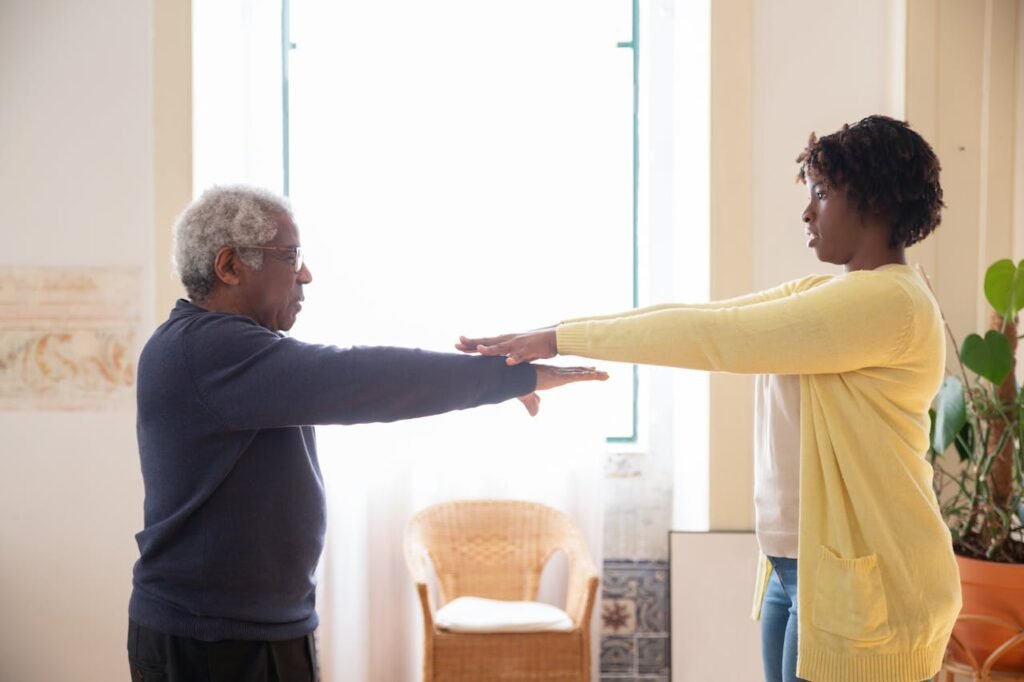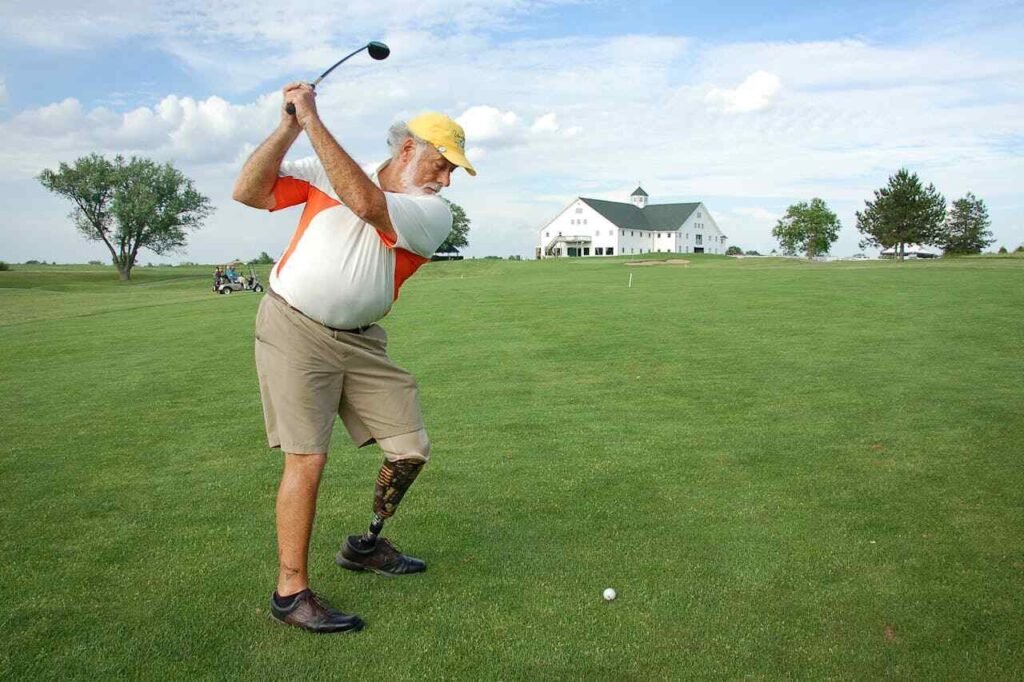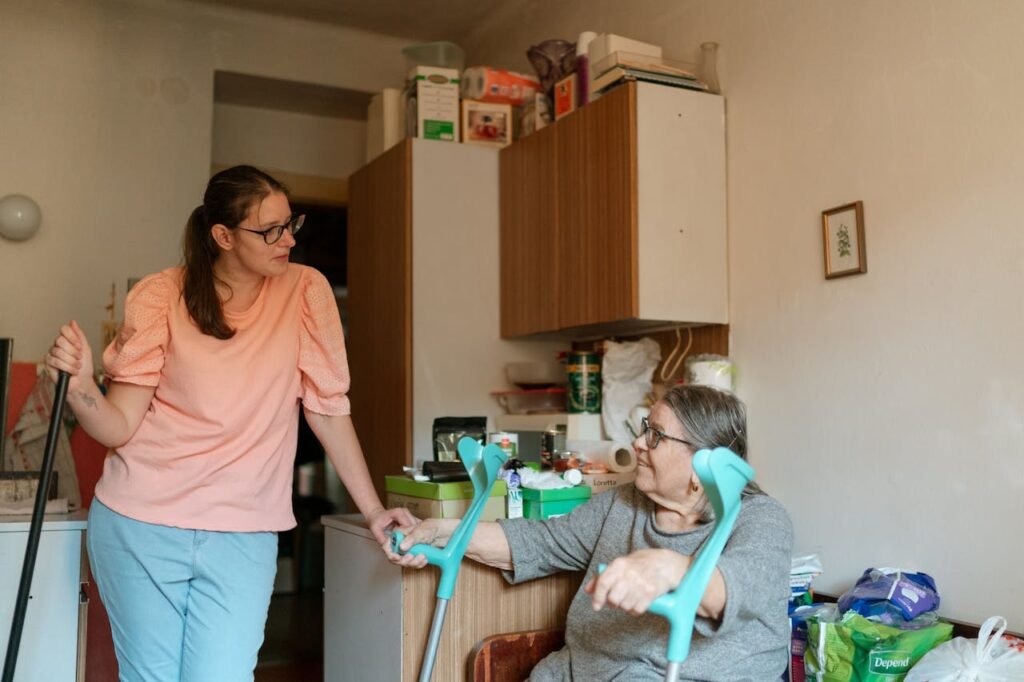For many seniors who use prosthetic limbs, medication is a regular part of daily life. Whether it’s for blood pressure, diabetes, heart health, or pain relief, these medicines keep the body stable and strong. But sometimes, they quietly bring side-effects that can make balance harder to maintain.
Even a mild feeling of dizziness, light-headedness, or tiredness can make walking or standing with a prosthesis more challenging. What once felt steady might suddenly feel uncertain. For seniors learning to move with confidence, this can be worrying.
The truth is, most medicines that affect balance don’t cause serious harm—but being aware of their impact helps prevent falls, fatigue, and frustration. The goal isn’t to stop taking essential medicines, but to understand them better and manage their effects wisely.
At RoboBionics, we work with seniors and caregivers every day who face this delicate balance—between staying healthy and staying steady. We’ve seen how small adjustments, simple awareness, and open conversations with doctors can make all the difference.
This article will walk you through how different types of medication can affect balance, how to spot warning signs early, and what practical steps can help seniors stay safe and confident with their prosthetic limbs.
Understanding How Medications Affect Balance
How the Body Maintains Balance

Balance may seem simple, but it’s actually a delicate process involving the brain, eyes, ears, muscles, and nerves. They all work together to keep the body upright and stable.
When any one of these systems is disturbed—by age, illness, or medication—the sense of balance can weaken. For seniors using prosthetics, this effect becomes more noticeable because the body already relies on coordination and focus to move steadily.
Even a small delay in the body’s response can cause unsteadiness or hesitation when walking or standing up. Understanding how medicines interact with the body helps seniors prepare and adapt before problems occur.
Why Medications Can Affect Balance
Most medications are designed to help one part of the body, but they sometimes influence other systems too. For example, a drug that lowers blood pressure might also reduce blood flow to the brain for a short time, making a person feel light-headed.
Others may cause drowsiness, slow reflexes, or alter muscle tone. When combined with a prosthesis—where balance already depends on careful body awareness—these effects can feel amplified.
Not all side-effects are severe. Some fade after a few days, while others may last longer depending on the dose, the person’s age, and overall health.
Seniors and Medication Sensitivity
As people age, their bodies process medication differently. The liver and kidneys, which filter out drugs, may work a little slower. This means medicine can stay in the body longer and have stronger effects than expected.
Muscles and nerves also react differently with age. A small change in blood sugar or pressure might make a younger person slightly dizzy, but for a senior using a prosthesis, it could mean losing balance or falling.
That’s why it’s important for seniors and caregivers to monitor how the body reacts after starting any new medicine. Awareness is the first step to safety.
The Link Between Prosthetic Use and Balance Challenges
Walking with a prosthetic limb already requires coordination and focus. Seniors often rely more on their vision and upper body to stay steady. When medication causes dizziness, blurred vision, or slower reaction time, these compensations can break down.
For example, a leg prosthetic user might misjudge a step because their sense of balance is slightly off. An upper-limb prosthetic user might feel unusually tired during transfers or find it harder to control arm movements.
Understanding how medicines affect the body’s rhythm helps users anticipate when extra caution is needed—like during early mornings, after meals, or right after taking medication.
How to Notice Early Signs of Balance Problems
Many side-effects start subtly. A senior might mention feeling “a little foggy” or “off balance” when standing up. Others may start moving slower or gripping furniture for support more often.
These are gentle warning signs that the medication might be influencing coordination. Dizziness, spinning sensations, blurred vision, and a feeling of weakness are the most common signs to watch for.
If these symptoms appear soon after taking a medicine, note the timing. It can help doctors decide whether dosage or timing adjustments could help.
Common Types of Medications That Impact Balance
Blood Pressure Medications
High blood pressure is common in seniors, and medicines to manage it are often lifelong. These drugs help protect the heart, but they can sometimes cause dizziness, especially when standing up suddenly.
This happens because certain medications—like beta-blockers or diuretics—can lower blood pressure too quickly. When the brain doesn’t receive enough blood flow for a few seconds, the body feels light-headed.
For prosthetic users, that brief moment of unsteadiness can be risky. Standing from a chair or climbing stairs may require more focus and control. It’s best to rise slowly, pause for a few seconds, and use a stable surface for support.
Checking blood pressure regularly also helps notice patterns. If dizziness occurs often, doctors can adjust timing or dosage safely.
Pain Relievers and Muscle Relaxants
After surgeries or during rehabilitation, many seniors take painkillers or muscle relaxants. These medicines bring relief but can slow reaction time, cause drowsiness, or blur coordination.
Opioid-based painkillers, for example, may cause dizziness or fatigue. Even over-the-counter drugs like some antihistamines or combination pain tablets can affect balance. Muscle relaxants, while helpful for stiffness, can reduce muscle control for several hours.
Seniors using prosthetics should schedule physical activity or walking practice when the effects of such medicine are mildest—usually after the body has adjusted or a few hours after taking the dose.
Diabetes Medications
Low blood sugar, known as hypoglycemia, can create confusion, shaking, and loss of balance. Seniors using insulin or certain diabetes pills need to monitor their sugar levels closely, especially before walking or exercising with a prosthesis.
If blood sugar drops too low, the brain and muscles don’t get enough energy to coordinate movement properly. This may lead to sudden weakness or trembling.
Keeping small snacks or glucose tablets handy can prevent these episodes. Eating meals regularly and never skipping breakfast before wearing the prosthesis also keeps energy levels steady throughout the day.
Sleep Aids and Anti-Anxiety Drugs
Sleep problems are common with age, and many seniors take sleeping pills or mild sedatives. While these medicines help with rest, they often leave lingering drowsiness the next morning.
This “hangover” effect can make early movements—like getting out of bed or using the bathroom—feel sluggish or unsteady. Some sedatives can also interfere with depth perception, making steps and curbs harder to judge.
If your loved one uses such medication, help them plan their morning routine slowly. Give the body time to fully wake up before wearing the prosthesis or walking longer distances.
Antidepressants
Many seniors take antidepressants to manage emotional health. Certain types, particularly older ones like tricyclic antidepressants, can cause dizziness, blurred vision, or a drop in blood pressure when standing.
Newer antidepressants usually have milder effects, but individual responses differ. A senior may feel perfectly fine one day and more tired or dizzy the next, depending on hydration, meals, and other medicines taken that day.
It helps to maintain a steady schedule—taking these pills at the same time daily, with food and enough water, to avoid sudden changes in the body’s rhythm.
Heart Medications
Medicines that regulate heartbeat or reduce cholesterol are essential for heart health but can also affect balance in subtle ways. Drugs that slow the heart rate might make seniors feel fatigued or light-headed during activity.
In such cases, prosthetic users may notice reduced endurance—climbing stairs or walking longer distances feels harder than usual. It’s not a sign of weakness but simply the body adjusting to slower circulation.
Frequent breaks and pacing throughout the day help. Gentle warm-up movements before walking also improve stability by increasing blood flow gradually.
Medications for Vertigo or Motion Sickness
Ironically, some drugs that treat dizziness can cause balance issues if used for long periods. They calm the inner ear, which helps during acute vertigo attacks, but long-term use may dull the body’s natural balance reflexes.
If your loved one is prescribed such medication, it should typically be short-term. If dizziness returns after stopping it, consult a doctor rather than restarting on your own.
The body often relearns natural balance better through guided physical therapy or gentle balance exercises.
Diuretics and Fluid Management Medicines
Diuretics, commonly called “water pills,” help remove excess salt and water from the body. They’re vital for heart and kidney conditions but can cause dehydration or lower blood pressure if fluid levels drop too quickly.
Mild dehydration leads to fatigue and dizziness—two key risks for prosthetic users. Seniors should drink enough water during the day, especially in hot weather, but balance it with their doctor’s fluid advice.
Electrolyte-rich drinks can help replace lost minerals without adding strain to the body.
Allergy and Cold Medicines
Even simple allergy or cold medicines can influence balance. Some older antihistamines cause drowsiness, blurred vision, or slow reflexes. Cough syrups that contain alcohol or sedatives can also make coordination harder.
It’s always best to choose non-drowsy versions when available, especially if walking or using prosthetics regularly. For seasonal allergies, timing the medication before bedtime instead of daytime can reduce interference with daily activities.
Combining Multiple Medications
The more medicines a person takes, the higher the chance of side-effects overlapping. This is called polypharmacy, and it’s common among seniors.
For example, combining blood pressure tablets with pain medication might amplify drowsiness. Or using a diuretic alongside antidepressants could cause sudden light-headedness when standing.
Keeping a single list of all medications—including supplements and over-the-counter products—helps doctors understand the full picture. It allows them to adjust doses and avoid harmful combinations.
Recognizing Warning Signs and Preventing Falls
Early Clues the Body Gives

The body often gives quiet warnings before a fall happens. A senior might say, “I feel a bit dizzy,” or “My legs feel weak today.” Sometimes, they simply move slower or pause longer before standing up. These are important signs to notice.
For prosthetic users, even small balance changes are magnified. If the body feels slightly off, controlling the prosthesis becomes harder. The person may take shorter steps, avoid certain movements, or rely more on furniture for support.
Encourage honest conversation. If they mention feeling “different,” don’t dismiss it as tiredness. A side-effect may be developing or a medication might need adjusting.
Dizziness and Light-Headedness
One of the most common side-effects linked to balance loss is dizziness. It may come as a spinning feeling, a wave of light-headedness, or a sudden foggy sensation when standing.
This usually appears soon after taking medication or when getting up quickly. Encourage seniors to move slowly between sitting and standing. Counting to five before taking the first step helps blood flow stabilize.
If dizziness happens often, keep a short diary. Write the time, medication taken, and how long the feeling lasted. This helps doctors pinpoint the cause faster.
Fatigue and Slower Reactions
Certain medicines make the body feel heavy or slow. The mind might react a second too late to a movement. When combined with a prosthesis, this delay can throw off coordination—especially during walking, climbing, or turning.
If fatigue appears after a particular dose, talk to the doctor about adjusting the schedule. Sometimes taking medication after meals or in the evening reduces daytime tiredness.
Encourage small rest breaks throughout the day. Sitting for five minutes every hour keeps energy levels even and prevents overexertion.
Muscle Weakness or Trembling
Some medications affect how muscles contract. This can lead to slight shaking, weakness, or stiffness—especially in the legs and arms.
If your loved one uses a prosthetic hand or leg, they might find it harder to grip objects or push off from the ground. This isn’t a lack of effort; it’s a temporary change caused by the medicine.
During such times, avoid activities that need high coordination, like walking on uneven surfaces or using stairs without support. Once the side-effect fades, regular movement can resume.
Changes in Vision or Focus
Blurred vision, double vision, or sensitivity to light can appear with several medications—especially those for allergies, sleep, or blood pressure.
Prosthetic users rely heavily on visual cues for balance. If their sight becomes unclear, depth perception can be affected. Misjudging a step or a chair’s position increases fall risk.
Good lighting helps reduce confusion. Make sure hallways and rooms are well-lit, especially at night. Avoid shiny floors that reflect light too sharply.
Mood and Mental Clarity
Certain drugs that affect the brain—like antidepressants or sedatives—can also change alertness. Seniors might seem distracted, forgetful, or move without full awareness of their surroundings.
If you notice slower responses or hesitation, give them time to focus before moving. Avoid multitasking during transfers; for example, don’t talk or carry items while they’re standing up.
A calm environment without noise or rush helps the brain process balance signals more clearly.
The Role of Hydration and Nutrition
Dehydration worsens many medication side-effects. Low fluid levels can lower blood pressure and cause weakness. Seniors who take diuretics or diabetes medicine must pay extra attention to hydration.
Encourage small sips of water throughout the day instead of large amounts all at once. Foods rich in potassium and magnesium—like bananas or leafy greens—help maintain muscle control.
Skipping meals or eating irregularly can also affect how the body absorbs medicine, leading to sudden dizziness or fatigue. Consistent meals at regular times create stability.
Safe Ways to Move When Feeling Unsteady
If a senior suddenly feels dizzy or weak, they should sit immediately. A sturdy chair, wall, or bed edge can prevent a fall. Never try to “walk it off.”
Encourage them to rest until the sensation passes. Once they feel steady, they can move slowly again. Using both hands for support or keeping a walking aid nearby adds extra safety.
At home, rearrange furniture to create clear walking paths. Remove small rugs, cords, or low stools that could cause tripping.
When to Call the Doctor
If dizziness, weakness, or blurred vision becomes frequent, contact a healthcare provider. Bring a full list of medications, including vitamins and supplements.
Doctors can identify whether a single drug or a combination is causing balance issues. They may change timing, reduce dosage, or switch to an alternative medicine that’s easier on the body.
Never stop any prescription without guidance. Sudden withdrawal can cause stronger side-effects or worsen the condition being treated.
Simple Strategies for Safer Days
Balance challenges can be managed with small daily habits. Encourage your loved one to sit while dressing, to use handrails on stairs, and to wear shoes with firm grip.
Stretching in the morning loosens stiff muscles and prepares the body for movement. If possible, short balance exercises—like standing near a wall and shifting weight gently side to side—help the brain and muscles stay coordinated.
Consistency is more important than intensity. A few minutes of safe practice every day strengthens stability more than rare long sessions.
Managing Medication and Staying Balanced: Practical Tips and Conclusion
Building Awareness and Routine

Balance begins with awareness. Seniors using prosthetics already focus on posture and careful movement—adding medication awareness strengthens safety even more. Keep a written routine that lists each medicine, its timing, and possible side-effects.
Place this list where it’s easy to see—on the refrigerator, near the bed, or inside a notebook. This helps track patterns if dizziness or fatigue occurs. It also helps doctors make better adjustments when needed.
Consistency matters. Taking medicines at the same time each day helps the body adapt to their effects. Irregular timing can cause energy dips or unsteady moments when the medicine is strongest.
Encourage your loved one to eat a small snack with medicines unless otherwise directed. Food often helps slow absorption, reducing sudden changes in blood pressure or energy.
Coordinating with Doctors and Pharmacists
No one should have to guess which medication causes balance issues. Doctors and pharmacists are the best partners for this. Schedule a review every few months to discuss side-effects, dosage, and whether certain combinations are still necessary.
Always bring all medications to appointments—prescriptions, vitamins, herbal supplements, and over-the-counter pills. This complete picture helps prevent interactions that could cause dizziness or weakness.
Ask simple, direct questions like, “Can this medicine affect balance?” or “What time of day is safest to take this?” Clear communication keeps everyone informed and reduces fear.
If a new medicine is added, monitor closely for the first few days. If you notice any new fatigue, unsteady walking, or blurred vision, note it down and inform the doctor quickly.
Managing Medication Timing for Better Stability
Timing can make a world of difference. Some medicines work best at night, allowing seniors to rest through mild side-effects. Others are better in the morning when energy levels are naturally higher.
For example, blood pressure pills that lower blood flow may cause morning dizziness if taken too early. Shifting them to evening (if approved by the doctor) can make mornings easier.
Pain relievers and muscle relaxants, which can cause drowsiness, are safest when taken before bedtime rather than during the day.
Every person’s schedule is unique. A little experimentation—done under medical supervision—often finds the perfect rhythm for comfort and safety.
Encouraging Slow, Steady Movement
For seniors using prosthetics, patience in movement prevents most falls. Encourage them to rise slowly, pause after standing, and take their first few steps mindfully.
Even if they feel fine, sudden shifts can surprise the body. Standing up too fast can cause a momentary drop in blood pressure, leading to light-headedness.
Balance improves when the body feels calm. Encourage deep breathing before each transfer—from bed to chair, from sitting to standing, or from standing to walking. This simple pause steadies both the mind and the body.
The Role of Strength and Balance Exercises
Medications may affect balance, but strong muscles and flexible joints can counteract those effects. Gentle daily exercises—approved by a physiotherapist—help improve coordination.
Seniors can try slow leg lifts, standing near a wall for support, or controlled arm stretches to build stability. Practicing sitting and standing transitions also improves core control.
For prosthetic users, balance training can include weight shifting, walking on smooth surfaces, and turning slowly in both directions. These drills train the brain to adapt even when medication temporarily affects balance.
If dizziness appears during exercise, pause immediately and rest. The goal is progress, not speed. Regular, careful practice builds lasting confidence.
Creating a Safer Home Environment
A few small home changes make every step safer. Keep walkways clear of furniture, cables, and mats. Good lighting in hallways and bathrooms reduces the risk of tripping.
Install handrails near stairs and grab bars in the bathroom. Non-slip mats by the bed, toilet, and shower provide extra support for prosthetic users during transfers.
Avoid slippers or loose footwear. Well-fitted shoes with strong soles give better grip and prevent sliding. For leg prosthetic users, check that shoes on both sides are the same height—uneven footwear can throw off balance.
Even simple things, like arranging commonly used items within easy reach, prevent unnecessary stretching or bending that might cause imbalance.
Managing Fatigue Throughout the Day
Many medicines cause tiredness or muscle heaviness. Help your loved one schedule activities when their energy is highest—usually a few hours after waking up or after lunch.
Encourage short breaks between chores. Sitting for five minutes every hour helps recharge the body. Hydration also matters—dehydration often worsens fatigue caused by medication.
Avoid long standing periods. If the prosthesis starts to feel heavy, remove it briefly while seated to rest the limb. A few moments of rest can restore comfort and balance.
Emotional Confidence and Mental Focus
When medications affect balance, fear often follows. Seniors may begin avoiding movement out of worry. This hesitation can reduce confidence and slow rehabilitation.
Reassure them that balance challenges are manageable and temporary. Encourage gentle movement instead of avoidance. Each successful step rebuilds trust in their prosthesis and body.
Staying socially engaged also improves confidence. A phone call, a walk with a family member, or an online exercise group adds motivation and reduces isolation.
Calm, positive surroundings help the brain stay sharp and focused—a major advantage when dealing with mild dizziness or fatigue.
Supporting Caregivers in Daily Monitoring
Caregivers play an important role in spotting side-effects early. Keep a shared notebook to record any changes—dizziness after certain pills, swelling, or extra tiredness.
Encourage open, non-judgmental communication. Seniors might hide discomfort to avoid worrying their family. Remind them that small changes are worth mentioning—it keeps them safe.
If you notice increasing unsteadiness, call the healthcare provider before making any adjustments yourself. Professionals can suggest alternatives or gradual dose changes.
When caring for a prosthetic user, always check the limb fit after medication changes. Swelling or muscle weakness can alter socket comfort, which might affect balance further.
Combining Tele-Rehab and Medical Guidance
Tele-rehabilitation, like the programs we at RoboBionics help organize, can be extremely useful for seniors facing balance challenges. Through video sessions, therapists guide safe exercises and track progress while keeping communication open with doctors.
This approach reduces travel stress, keeps routines flexible, and helps seniors stay active from home. Therapists can even identify when medication-related symptoms—like dizziness or tremors—affect movement, allowing faster adjustments.
When technology, care, and medical advice work together, recovery becomes smoother and more personal.
The Importance of Regular Prosthetic Maintenance
Sometimes balance problems aren’t only from medication—they may combine with minor prosthetic issues. Loose sockets, worn footplates, or sensor misalignment in bionic devices can make the user feel unstable.
Routine maintenance checks every few months ensure everything fits perfectly. If your loved one suddenly starts stumbling or shifting weight unevenly, inspect the prosthesis before assuming it’s only a medical issue.
Cleanliness matters too. Sweat and skin oils can make liners slippery. Wiping and drying both the prosthesis and residual limb daily prevents slippage and discomfort.
At RoboBionics, we always remind users that a well-maintained prosthesis gives confidence no matter what medication they take.
Coordinating Care Across Specialists
Many seniors have multiple doctors—cardiologists, diabetologists, physiotherapists, prosthetists. Sometimes, each prescribes medications without full awareness of the others. Coordinating between them avoids dangerous overlaps.
Encourage your loved one to carry a complete medication list to every appointment. It helps each specialist consider the overall impact on balance and energy.
If possible, schedule one central consultation every few months to review all treatments together. This holistic approach keeps care safer and simpler.
Living with Awareness, Not Fear
It’s easy to feel anxious about medication side-effects, but awareness brings control. Knowing what to expect helps seniors move confidently and react calmly when symptoms appear.
Balance issues are manageable with preparation—safe movement habits, regular check-ups, good nutrition, and open communication. Fear fades when knowledge grows.
Every senior deserves to walk, stand, and live with confidence, even while managing complex medical routines.
Conclusion: Balance Is the Foundation of Independence

Medications are essential for health, but they should never take away the freedom to move. For seniors using prosthetics, understanding side-effects is the first step to preventing falls and building stability.
A prosthetic limb gives back independence, and with awareness, it stays that way. Small daily habits—standing slowly, staying hydrated, checking the prosthesis fit, and keeping doctors informed—make every movement safer.
At RoboBionics, we design advanced prosthetics like the Grippy™ Bionic Hand and locally engineered lower-limb solutions that move naturally and comfortably with the body. But we also believe in complete care—educating users and caregivers to manage health wisely.
If you or your loved one are adjusting to life with a prosthesis and medications, we can help guide you through both. From proper fitting to tele-rehab and safety training, our experts are here to make every step easier.
You can book a free consultation or demo at www.robobionics.in/bookdemo.
Because balance isn’t just physical—it’s emotional, mental, and deeply human. With the right prosthesis, mindful care, and informed choices, every senior can stand tall, steady, and proud again.



